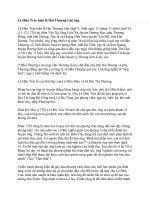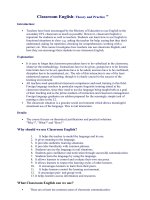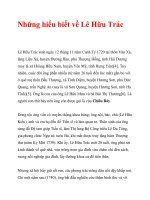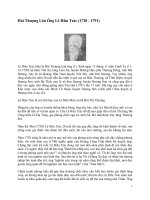LE HUU TRAC 2
Bạn đang xem bản rút gọn của tài liệu. Xem và tải ngay bản đầy đủ của tài liệu tại đây (58.04 KB, 2 trang )
Classroom English: Theory and Practice "
Introduction:
• Teachers have been encouraged by the Ministry of Education to use English in the
secondary EFL classroom as much as possible. However, classroom English is
important for students as well as teachers. Students can learn how to use English in
functional situations in class: e.g. asking the teacher for help; saying that they don't
understand; asking for repetition; checking for comprehension; working with a
partner; etc. This course investigates how teachers can use classroom English, and
how they can encourage their students to use classroom English.
Explanation:
• It is easy to forget that classroom procedures have to be verbalized in the classroom,
whatever the methodology. Instructions have to be given, groups have to be formed,
time limits have to be set, questions have to be asked, answers have to be confirmed,
discipline has to be maintained, etc. The role of this interaction is one of the least
understood aspects of teaching, though it is clearly crucial to the success of the
learning environment.
• All teachers need specialized classroom competence and need training in this field.
Foreign language teachers in particular require linguistic training aimed at the
classroom situation, since they need to use the language being taught both as a goal
of their teaching and as the prime medium of instruction and classroom management.
Foreign language graduates are seldom prepared for the seemingly simple task of
running a class in the L2.
• The classroom situation is a genuine social environment which allows meaningful
situational use of the language. This is real interaction.
Details:
• The course focuses on theoretical justifications and practical solutions:
"Why?", "What?" and "How?"
Why should we use Classroom English?
1. It helps the teacher to model the language and its use.
2. It gives meaning to the language.
3. It provides authentic learning situations.
4. It provides familiarity with common phrases.
5. Students can use the language in real situations.
6. Students gain confidence and motivation through successful communication.
7. Students learn the language by using the language.
8. It allows learners to control and evaluate their own successes.
9. It allows learners to respect the learning styles of other learners.
10. It encourages learners to learn from their peers.
11. It helps learners control the learning environment.
12. It encourages pair- and group-work.
13. It helps learners access information and resources.
What Classroom English can we use?
• There are at least ten common areas of classroom communication:
There will be many things to do in this course, and many things to talk about. However,
please remember that education is aimed at students, and the students are the most important
people in this course and in every course. There will therefore be a continuous focus on
learner-training, self-assessment, goal-setting, reflection and evaluation.This course is for
you, and you will therefore be helping to make it and evaluate it!
Methods
The course consists of three 50-minute periods each week for 16 weeks. Each period will
look at Classroom English from a specific perspective:
• Period 1
This period will will focus on a theoretical concept for the week
• Period 2
This period will focus on active use of classroom English in activities and role plays.
• Period 3
This period will focus on lesson presentations given by students.









